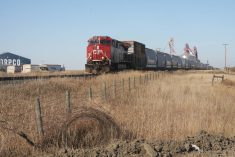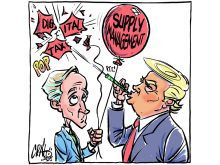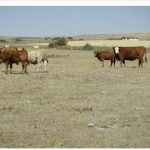Positive news
When I was a Grade 9 student at Dr. Brass in Yorkton, Pierre Trudeau made a stop for a couple of hours and the entire school went to see him.
We had the option of either going or remaining in the home economic lab to finish a project.
As a young Liberal, one would have thought I would be up front and centre for such a visit but being young and naïve, I didn’t think I would stand a chance of getting all that close to him with so many others around and I opted out for staying in the lab. One of life’s small regrets.
Read Also

Agriculture needs to prepare for government spending cuts
As government makes necessary cuts to spending, what can be reduced or restructured in the budgets for agriculture?
To be in close proximity to the leader of our country, no matter what your politics, is something that doesn’t come along every day.
So, when I was given an opportunity to meet prime minister Stephen Harper on his first official visit to Saskatchewan, I jumped at the opportunity. I was thrilled….
The next day, listening to the news, I wondered if I had been at the right barbecue.
There was no mention of all that this government has done in the short time it has been in power. Everything was focused on what hasn’t as yet been accomplished. …
All I heard was when was he going to address the equalization issue. This is the first government in a very long time that has made promises and actually kept them. My faith is slowly being restored.
Prime minister Harper has said that equalization does not have an easy answer and will take time. He has said that his government is working on the issue and he has used the word “committed” to bringing about a solution with consensus with the provinces.
I believe more can be accomplished by positive thinking than by negativity. I encourage the media to report events such as this barbecue in a more positive vein.
– M. L. Whittles,
Kenaston, Sask.
Careful wish
Life in a dual marketing setting. I can see it now: no more producer cars, no more short-line railways.
Grain companies would not want to give up their elevation charges so why would they handle producer cars? Without producer cars, there would be no need for short-line railways. There goes the producer savings on handling charges.
The port of Churchill would be gone as well. Grain companies cannot make money shipping to someone else’s terminal.
The Canadian Wheat Board would not last very long. What grain company would allow the use of their facilities by a competitor? Without facilities there is no way to guarantee timely delivery to a customer.
As far as Agricore and SWP, they would get swallowed up by the huge multinationals who have very deep pockets and even now have an interest in these Canadian companies.
The CWB is the only marketer that sells Canadian grain exclusively. Multinationals, when they make a sale, will fill that market from the cheapest source and the cheapest source will probably be from a country that subsidizes production.
The quality premium will end up in the pockets of the grain elevator companies rather than in the producers’ accounts.
After all, the name of the game is to buy low and sell high. It is only good business for the grain companies.
Producer owned terminals would be phased out of business because they lack export facilities. Why would the multinationals allow a few farmers to run their own elevator when they could earn the handling charges on that grain themselves?
Farmers may want to organize co-ops to market their grain but it would be extremely difficult if not impossible for them to move this grain to the market, given the fact that there will not be any producer cars and that they do not have export facilities.
The proponents of a dual market system have not shown us a vision of the world as it will be if this system is put in place.
Is this because it would show that farmers would be captives of the multi-nationals?
It’s appalling that the government wants to put a dual marketing system into place without a producer vote when law requires a vote if there are to be fundamental changes to the CWB Act. …
So a word of caution to those who would like to see a dual market system: be careful what you wish for because you just might get your wish.
– Maurice Kostichuk,
Insinger, Sask.
Watch closely
As a grain farmer, I am very concerned with the present government’s plan to dismantle the Canadian Wheat Board. Most farmers would agree that the main problem facing Canadian grain farmers is not the CWB, it is the massive subsidies paid out by the United States and the European Union.
The Americans and Europeans have long been pushing our government to dismantle the wheat board as they feel it gives Canadian farmers an unfair advantage in the marketplace.
To unilaterally dismantle the board would essentially be throwing away the only card we have in talks to eliminate these trade and price distorting subsidies.
I have no illusions that we will be able to keep the wheat board indefinitely. However, I do believe that we should get something in return for its demise.
The present signals from the federal government have already weakened our position in terms of world trade talks. As the government’s position does not make sense in terms of helping farmers it begs the question, have they been bought out by “donations” from large multinational grain companies or do they not understand the issues?
Furthermore, our government’s action on the Own Use Import regulations for farm chemicals is disappointing. …
As farmers, we do not have the money to compete with the “donations” of multinational corporations, if that is what is happening.
We do, however, have a small amount of power when we mark the X on our ballot in the next election.
I voted Conservative in the last election. In the following months I will be closely watching the government’s actions on these issues and will then decide where my X will be placed the next time round.
– Philip Simrose,
Parkbeg, Sask.
A mandate?
It seems that the federal Conservatives after being elected, albeit with a minority, feel they have the mandate to dismantle the Canadian Wheat Board without giving farmers a say in the matter. They say it’s just not going to happen. They say it was a campaign promise.
Well, I have a few questions to ask.
Firstly, when have the Conservatives done a 180 on their campaign promise regarding non-renewable natural resources?
Prime minister Stephen Harper rationalized this by saying he was certain they were not elected on one campaign promise only.
Secondly, what has become of the campaign promise to replace the Canadian Agricultural Income Stabilization program?
This program is an administrative nightmare and is increasingly being referred to by farmers as the Chartered Accountants Income Security. This must be another campaign promise that they were not solely elected on.
Thirdly, why has MP David Anderson refused a head to head debate on the CWB issue? Is he afraid of the outcome?…
Whatever the outcome, it is vital that we as farmers demand to make that decision.
It is totally unacceptable to proceed in this dictatorial fashion and if the Conservatives were smart, they would back off on this approach and let those directly affected determine their fate.
Now, more than ever, we as farmers must demand our democratic rights.
– Don Bamber,
Oyen, Alta.
Transparency
In his most recent public attack on the Canadian Wheat Board, David Anderson, MP for Cypress Hills-Grasslands, tries to turn reality on its head.
While he claims the federal government is consulting with farm groups in a “transparent manner” over the issue of grain marketing, the facts reveal a different story.
There is nothing transparent about Anderson’s secret invitation list to grain companies and friends for a government-funded July meeting in Saskatoon.
Nor is it reasonable to describe as transparent the high-security press conference following the meeting, which excluded the public and farm organizations.
But probably the least transparent tactic was a phone call from agriculture minister Chuck Strahl’s office to a large-circulation farm newspaper in the wake of the July meeting.
The phone call was a thinly disguised pressure tactic aimed at creating problems for a freelance columnist who had the fortitude to stand shoulder-to-shoulder with farmers in support of the Canadian Wheat Board.
Finally, Anderson reveals his reluctance to engage in truly transparent dialogue with farmers by refusing to accept an invitation from the National Farmers Union to a public debate on the CWB.
We issued the challenge last June, and Anderson has yet to acknowledge the invitation. The challenge still stands, by the way.
The lenses through which Anderson is looking are not transparent. In fact, he is so close-minded on this issue that it is fair to characterize his eyewear as ideological blinders. He and his cohorts will say and do anything to hasten the demise of the CWB.
It’s time for farmers to say no to the loss of an effective CWB, and no to the loss of $800 million annually from the western farm economy.
– Stewart Wells,
President,
National Farmers Union,
Saskatoon, Sask.
















